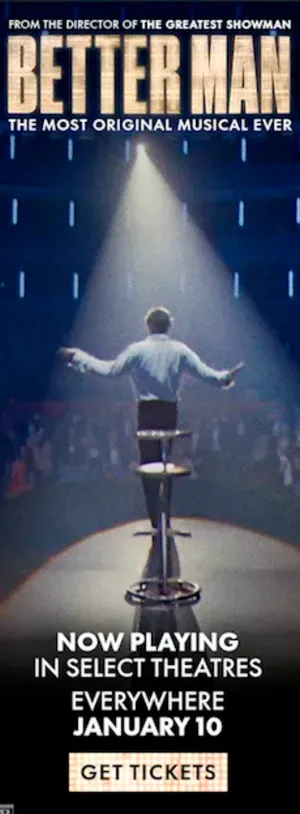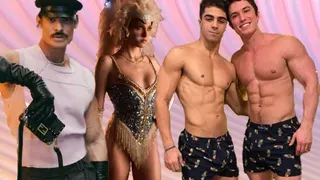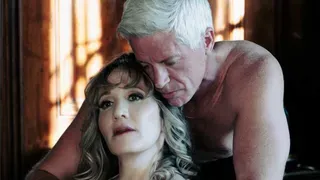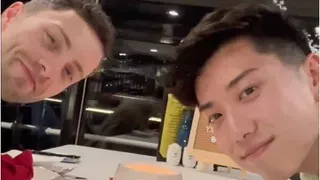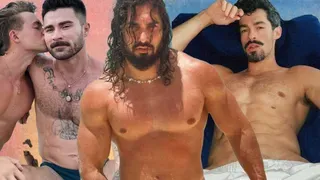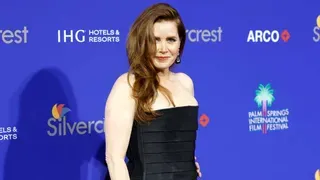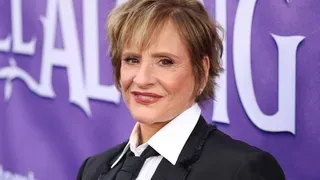May 22, 2024
Queer Love Behind Bars – Star & Director of 'The Lost Boys' Discuss Their Recently-Released Prison Drama
Frank J. Avella READ TIME: 13 MIN.

EDGE: In "Lie With Me," you and Jeremy also had great chemistry.
Julien De Saint-Jean: Yes, Jeremy. That audition process was really complicated for so many reasons... the director paired us together and said, "It's you guys." But we waited four months for the producers to say yes to the film. So, we became friends, in Paris... and when we arrived on set, the first thing that we did was the first intimacy scene, so it was a quite intense, but we were [such good] friends that it was beyond a working relationship.
EDGE: As an actor, do you find that when the director yells cut, you become Julien again? Or do you take a little bit of the character home with you?
Julien De Saint-Jean: Good question. For me, I'm more Julien out of takes, but there's always scenes that really move you. And you're like, "Okay we've lived something, we experienced something strong." And that's in your memory. There was a scene with the Khalil when we smoke a cigarette, and he looks at me and smiles, and it really moved me.
EDGE: "Count of Monte Cristo" is opening soon?
Julien De Saint-Jean: Yes, "Count of Monte Cristo" is going to be presented in Cannes in two weeks. Out of competition. But still an official selection, which is great. I was actually writing questions and responses because I've got a lot of interviews, and I don't want to fuck it up. [Laughs] It's a really different movie. A major production. Like, $50 million budget – really rare in the French [film] industry... I was really scared during shooting, but now it's cool. I really like the movie. It's so great.
EDGE: Will you have short hair in the film as well?
Julien De Saint-Jean: Not really. It's a bit long. In all my movies, they want to cut my hair. I don't know why. I did a movie in Asia, in Taiwan. I just finished it four days ago. And they buzzed my hair, I was like, "Nooo!" I want my hair long for now. For "Monte Cristo" it's just a bit longer than this. Because I've waited like a year to have long hair. And first we did a scene with long hair. And then they cut it!
EDGE: Tell me about the film you just wrapped in Taiwan.
Julien De Saint-Jean: It's by Régis Wargnier, who won an Oscar in 1992 for "Indochine," with Catherine Deneuve.
EDGE: Great film. France's last International Feature Oscar to date.
Julien De Saint-Jean: Exactly. He's now 76 years old, and he hasn't made a film in 10 years. It's a movie about cooks. We [filmed] in Taiwan. I had never been to Asia. It's wonderful to travel and [experience] different cultures. It was intense shooting, but it was really nice.

Part Two: A Conversation with Director Zeno Graton
EDGE: Zeno, the two lead boys have little inhibitions regarding their attraction toward one another, and there's a refreshing lack of backstory given to us.
Zeno Graton: Yeah, the main goal was to make a story that I wanted to see on screen. The fact that they don't have these inhibitions is a reflection of a certain youth generation that I was witnessing around me, where they were more free inside than they were from outside conflicts. The prison was embodying this homophobic world that we still live in, but then they don't have this inner shame inside themselves. And they have to fight external obstacles instead of internal obstacles. For me, it was also to deploy a romantic love story that I felt we deserved... I was thinking a lot about "Happy Together" by Wong Kar-wai. I was also inspired by new shows like "Euphoria." ... And maybe it's a little utopian, considering the world we still live in. But I prefer to have this kind of utopia... It was also important for me to normalize tolerance instead of normalizing intolerance. When I was in these places, I was seeing a lot of solidarity and a lot of support for each other... The only homophobia is this hypocritical homophobia from the institutional representatives telling the queer youth that they can't [be themselves].
EDGE: There's quite a bit of Jean Genet in the film. In "Querelle" you always kill the thing you love. In "Lost Boys" that is not the case. You actually fight for the thing you love.
Zeno Graton: Yeah! Of course, Genet is everywhere, and a huge inspiration for this film. Genet is really about treason and how you kill the one you love, like the song. But the drama, for me, resides in the criticism of this institution, which is already dramatic enough. And their love is the silver lining that melts the ice that surrounds their desire and surrounds their freedom. I really wanted to talk about desire as a means of liberation... Where, if you embrace your queerness, all the walls around you are gonna fall.

EDGE: Was the casting process difficult?
Zeno Graton: ... I had a lot of fun doing it... We found Julien first. He was an absolute, "Okay, it's him!" I wanted this mysterious guy who could also be very at ease with these kinds of scenes. We asked him to stay for the auditions of the other character so we could find the match. And when Khalil entered, he had this tenderness that was very natural. They're very different. Julien is a very trained actor [via] major schools in Paris. Khalil is very intuitive in his approach to acting... Then we did this group casting where they all had to improvise. I had a very good Belgian casting director... Then I had to fight for rehearsals. We had one week with everybody, in order to make them feel comfortable together – eat together, dance together, rehearse scenes together, mostly doing improvisations and exercises. And then we brought them into the facility... it was very important that they had a humility about what we were doing... They became friends really quickly, and they still are.
EDGE: There are elements of "Cool Hand Luke" and "One Flew Over the Cuckoo's Nest" in "The Lost Boys." These films where a section of society is completely discarded. How do we fix the system so that you can be your own person, you can be a nonconformist, and still survive in this world?
Zeno Graton: A lot of people are actually working [on] that. There's an observatory in Belgium, they have a branch for incarcerated youth. What they've been doing since last September is screening the film inside these facilities to raise questions from the kids about their detention conditions. I couldn't be more proud about that. It's like a legal team that advocates for youth rights. They make an impact.
"Cool Hand Luke," "One Flew Over the Cuckoo's Nest" were [films] that really crafted my political views on the world. Two big inspirations, as well as films like "Brubaker."... All these films that tried to make a difference. "Cool Hand Luke" and "Cuckoo's Nest" were very big inspirations for the ending, too. These endings are very sad. And I wanted the audience to understand that these kids sometimes go to actual jail. But it was also a trick for me to end it in a nice way that they are together in this shithole. It's kind of my view on what queer love is. We are together in this shithole, in this homophobic society that we are doomed to fucking live in. And the only thing we have is the crew – the family – that we create along the way, as well as partners that we maybe have.
Both interviews have been edited for content, clarity and length.
According to the website JustWatch, "The Lost Boys" is available to rent, buy or download at Apple TV, Vudu, Google Play Movies, and YouTube.
Watch the trailer to "The Lost Boys"
Frank J. Avella is a proud EDGE and Awards Daily contributor. He serves as the GALECA Industry Liaison and is a Member of the New York Film Critics Online. His award-winning short film, FIG JAM, has shown in Festivals worldwide (figjamfilm.com). Frank's screenplays have won numerous awards in 17 countries. Recently produced plays include LURED & VATICAL FALLS, both O'Neill semifinalists. He is currently working on a highly personal project, FROCI, about the queer Italian/Italian-American experience. He is a proud member of the Dramatists Guild. https://filmfreeway.com/FrankAvella https://muckrack.com/fjaklute
